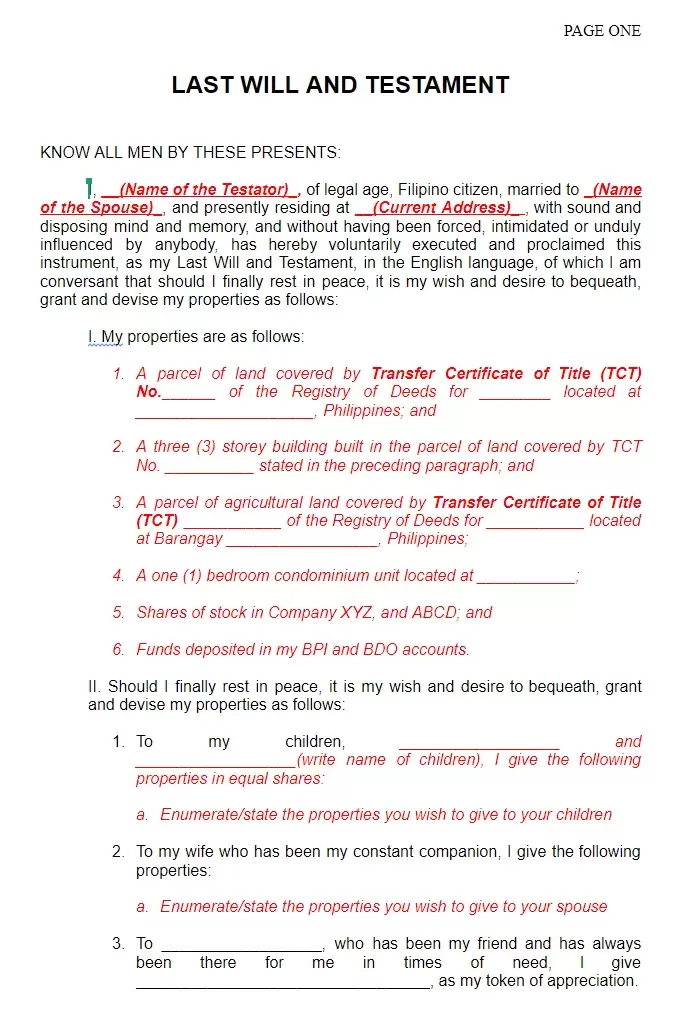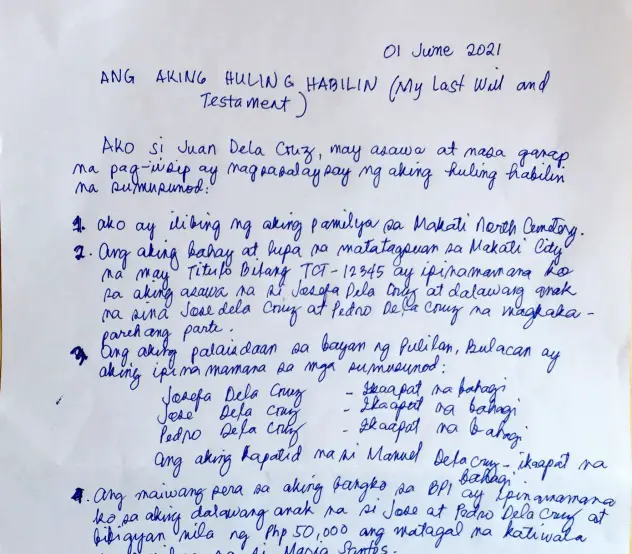Last Will and Testament Philippines: Sample and How To Make One

Have you ever thought of making a last will and testament?
Perhaps it did not cross your mind because most live without the thought of dying one day. However, as death is inevitable, settling your affairs while still around is filled with practicality. It will give you peace of mind that your wishes are carried after you are gone. It also prevents a scenario where your loved ones quarrel over an inheritance.
In this article, let’s dive into what a last will and testament is and how you can make one. I’ll provide you with tips and techniques, and answers to your most frequently asked questions.
DISCLAIMER: This article has been written for general informational purposes only and is not legal advice or a substitute for legal counsel. You should contact your attorney to obtain advice with respect to any particular issue or problem. The use of the information contained herein does not create an attorney-client relationship between the author and the user/reader.
Table of Contents
What Is a Last Will and Testament?
Article 783 of the New Civil Code3 defines last will and testament (or simply a will) as an act whereby a person is permitted, with the formalities prescribed by law, to control, to a certain degree, the disposition of his estate, to take effect after his death.
Let us say you are married with three legitimate children and one illegitimate child. You have several properties, including a house and lot, personal properties, and a business. You now plan to draft your own last will and testament.
Here are the basic concepts and terminologies you should know:
- As the person who makes the will, you are called a testator.
- When you die, all your personal and real properties are called your estate.
- All the persons named in your will who will receive your estate are called your heirs.
- Your legitimate and illegitimate children and your spouse (your parents if you have no children) are your compulsory heirs.
- The portion of your estate you cannot give to another person because it is reserved for your compulsory heirs is called legitime, whereas the other portion you can give freely to others (e.g., friends) is called a free portion.
- If you give personal properties, the receiver is called a legatee; if real property, a devisee.
Who Can Write a Last Will and Testament in the Philippines?
All persons of either sex and above eighteen (18) years old who are not expressly prohibited by law may make a will.
If you are a married woman, you may also make a will even without the consent of your husband. You can dispose of all your separate properties and your share in the conjugal properties.
What Are the Different Types of Last Will and Testament?
There are only two types of will in the Philippines – notarial and holographic.
1. Notarial Will
As the name suggests, a notarial will is a will that is subscribed, attested, and acknowledged before a notary public.
A notarial will must have at least three (3) credible witnesses who will attest that the testator wrote the will in sound mind and memory and later signed the document in the presence of one another. The will is required to be notarized.
Who can be a witness to a notarial will?
A witness must be:
- at least eighteen (18) years old
- of sound mind
- not blind, deaf, or dumb
- able to read and write
If you are not living in the Philippines, or if you have been convicted of falsification of a document, perjury, or false testimony, you cannot be a witness to a will.
2. Holographic Will
A holographic will is an entirely hand-written will. Unlike a notarial will, a holographic will need no witnesses, no other formal form, and can be made even if you are outside the Philippines.
Notarial Will vs. Holographic Will: Which One Is Better?
Some testators prefer to write a notarial will as they want advice from a lawyer. A notarial will is formal with witnesses who can later testify during probate proceedings. A copy of the holographic will might get lost, and because it has no witnesses, the testator’s wishes might not be carried out.
On the other hand, others prefer a holographic will because it is simple to make and is not required to observe strict formalities. It is also practical if the testator has no access to a notary (e.g., when sick or bedridden). One mistake in executing a notarial will might cause its disallowance. In addition, it does not cost anything.
Whether you make a notarial or a holographic will is okay, as both are valid in the Philippines. The choice is up to you on what is practical and convenient given your circumstances.
Should You Write a Last Will and Testament?
The prevalent mindset among Filipinos is that only the wealthy should make a will. However, even if you are not rich, you can make a will because it provides the following benefits:
- It gives you comfort that your wishes are carried out even after you die
- You have control over how your properties are distributed. You get to decide what property is given to whom based on who needs it the most or the level of your love and affection to specific heirs.
- You prevent potential quarrels and disputes among your heirs
- If you want to disinherit a compulsory heir, you can do so only through a will.
However, the disadvantage of having a will is that a court proceeding is still needed to distribute your properties. Heirs will not get your estate automatically when you die.
Also, if you only have one or a few properties and are sure you will leave all of them to your compulsory heirs in equal parts, it might be practical to no longer make a will. If you trust that they will divide the properties equally even if you are not around, it might be best to let your compulsory heirs divide it through an Extra-Judicial Settlement.
Dos and Don’ts in Executing a Last Will and Testament
At the onset, it is best to do the following when planning to write a will:
- Decide if you intend to write a notarial will or a holographic will
- Should you decide on a particular type, ensure you follow the prescribed form so that your will is not disallowed/invalidated during the probate proceedings
- Make an inventory of all your properties
- Make a list of all your heirs and assign who gets to have what
- If you have compulsory heirs, make sure not to dispose of/give their legitime to other persons
How To Write a Last Will and Testament in the Philippines: A Step-by-Step Guide
Writing a will requires certain formalities to be valid. Some cases reached the Supreme Court where a will was disallowed because it did not meet requirements. To avoid this scenario, below is a guide on making a valid will.
1. Notarial Will
Step 1: Download the free editable last will and testament template below. You can work on this template to guide you in making your dispositions.
Free Downloadable Last Will and Testament Template

Step 2: Fill out the items in red.
- Your personal circumstances (name, civil status, name of the spouse, if any, and address)
- In item I, list or describe all your properties, both real and personal
- In item II, write your dispositions or how your properties will be distributed among your heirs
- Should you acquire additional properties after you write your last will and testament, state how you want them to be distributed
- Indicate who will be your executor. An executor is a person you appoint who will carry out your wishes. Indicate a substitute should the executor be unavailable.
- Write the names and addresses of your witnesses (at least 3) in the attestation clause.
Please note that this is just a suggested format. You can add as many statements as you wish. Some testators like to include their desired burial rights and statements/declarations of love and affection to their heirs.
Step 3: Once you have filled out the details, including the acknowledgment, print copies of your will. You may print as many copies as you deem necessary. The notary public is not required by law to retain copies of your will.
Step 4: In the presence of the notary public and your witnesses, affix your signature on the left margin of each page of your will except the last (the signature portion, attestation, and acknowledgment). The witnesses shall likewise sign in the same manner.
Step 5: The notary public shall notarize your last will and testament once signed.
If you don’t want to go through the process of making a DIY last will and testament, you can hire a lawyer or the notary public so the latter can assist you in drafting your will.
2. Holographic Will
Writing a holographic will is pretty straightforward. You need to have a pen and paper and write your will in your handwriting. No other form aside from this is required.
When writing a holographic will, please take note of the following:
- The contents must be made entirely in your handwriting; hence, the will is invalid if the contents are typewritten or printed using the computer.
- It must be signed by hand.
- It must also be dated by hand. A will with no date is not valid.
- Dispositions/contents below your signature must be signed and dated; otherwise, the disposition is not valid.
- If there are any insertions, cancellations, or erasure, you must authenticate the same by the full signature (not just initials)
Here’s a sample of what a holographic will would look like to give you an idea.

What Is the Probate of the Will?
As discussed above, the heirs will not automatically get the deceased’s estate. A judicial proceeding is required for the last will and testament to be implemented. The proceeding is called probate4. Probate of the will can be made by the testator himself while he or she is still alive or by the executor, heirs, or any interested person after the testator’s death.
The probate of the will is done simply to validate its execution, i.e., whether the will is authentic and duly executed by the testator and was made following the law and the required formalities.
Given this is a court proceeding, the interested person should hire a lawyer to help draft the petition to be filed in court.
Tips and Warnings
- Ensure you don’t exclude any compulsory heirs in writing a will. If you exclude a compulsory heir, you should state why you are disinheriting him or her. Disinheritance should be based on specific causes provided under the law.
- In writing a notarial will, ensure that the attestation clause and the acknowledgment expressly state the number of pages of the will. In one case, the Supreme Court disallowed a will for failure to specify the number of pages in the attestation clause and the wrong number of pages in the acknowledgment. This is important to avoid inserting or omitting pages in the will.
- Ensure you have at least three (3) witnesses to your will. The will was disallowed in one case as it only had two witnesses. The notary public who notarized the will cannot be a 3rd witness.
Frequently Asked Questions
1. Is a last will and testament legally binding?
Yes, a last will and testament is legally binding or valid and enforceable if the same was executed following the formalities required by law. Hence, if a will is defective, i.e., not notarized for a notarial will, the court may disallow it in the probate proceedings.
2. Can a last will and testament be contested?
Yes, any interested person can contest the will. The court will disallow a will if any of the following is present5:
a. The formalities required by law have not been complied with;
b. If the testator was insane or otherwise mentally incapable of making a will at the time of its execution;
c. If it was executed through force, under duress, or the influence of fear or threats;
d. If it was procured by undue and improper pressure and influence on the part of the beneficiary or of some other person;
e. If the signature of the testator was procured by fraud; and
f. If the testator acted by mistake or did not intend that the instrument he signed should be his will when affixing his signature thereto.
3. Can you write your own will and have it notarized?
If you are writing a holographic will, notarization is not needed. If you are writing a notarial will, you can write or make your own will following the procedure discussed in this article and have a notary public notarize the same.
4. How long is a last will and testament valid?
A last will and testament is valid as long as the testator does not revoke it at any time before his death. A will is revoked6 in any of the following cases:
a. By implication of law
b. By some will, codicil, or other writing executed as provided in case of wills; or
c. By burning, tearing, canceling, or obliterating the will to revoke it
5. How much does it cost to make a last will and testament in the Philippines?
If you are making a holographic will, there is no cost, as you only need a pen and paper to make one. If you make a notarial will, the cost varies depending on the notary public who will notarize the document. It ranges from Php 5,000 to Php 10,000 or more, depending on the complexities of the will and your testamentary dispositions.
References
- Republic Act No. 386 (Civil Code of the Philippines), Article 839 (1949).
- Republic Act No. 386 (Civil Code of the Philippines), Article 830 (1949).
- Republic Act No. 386 (Civil Code of the Philippines), Article 783 (1949).
- Rules of Court (1997).
- Republic Act No. 386 (Civil Code of the Philippines), Article 839 (1949).
- Republic Act No. 386 (Civil Code of the Philippines), Article 830 (1949).
Written by Atty. Kareen Lucero
Atty. Kareen Lucero
Kareen Lucero is a lawyer previously doing litigation before working for different agencies in the government and for a multinational corporation. She has traveled to 52+ countries including a 3-month solo backpacking in South East Asia and more than 1 year of solo traveling across four continents in the world. As part of giving back, she is passionate about sharing her knowledge of law and travel. She is currently doing consulting work for a government agency. For inquiries, you may reach her via Facebook Messenger (https://m.me/kareen.lucero.77) or email ([email protected]).
Copyright Notice
All materials contained on this site are protected by the Republic of the Philippines copyright law and may not be reproduced, distributed, transmitted, displayed, published, or broadcast without the prior written permission of filipiknow.net or in the case of third party materials, the owner of that content. You may not alter or remove any trademark, copyright, or other notice from copies of the content. Be warned that we have already reported and helped terminate several websites and YouTube channels for blatantly stealing our content. If you wish to use filipiknow.net content for commercial purposes, such as for content syndication, etc., please contact us at legal(at)filipiknow(dot)net
